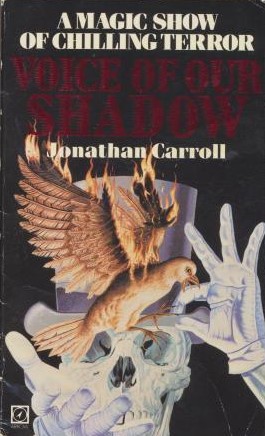 By JONATHAN CARROLL (Arrow; 1983)
By JONATHAN CARROLL (Arrow; 1983)
Jonathan Carroll is simply one of the interesting horror-fantasy writers there is. Idiosyncratic, endlessly thought-provoking and compulsively readable, Carroll’s novels aren’t like anyone else’s. I don’t feel all his books are completely successful, but it’s my contention that all of them provide wonderful and thoroughly unprecedented reading experiences.
VOICE OF OUR SHADOW was Carroll’s second novel. It’s been praised by Stephen King as a novel he wishes he’d written himself, but in truth the only person who could have penned this sexy, disquieting and delirious tale, or even conceived it, is the one and only Jonathan Carroll.
Like many of Carroll’s other novels it’s told in the first person. The point of view is that of Joe Lennox, a young writer haunted by childhood memories of his deceased brother, whose death Joe can’t help but feel responsible for. The story begins oddly, with detailed childhood memories that don’t pertain to the bulk of the novel. However, they have a way of pervading the narrative like a contagious malady, and there’s an unexpected death that eerily parallels Joe’s brother’s tragic demise.
Such eccentric touches are typical of Carroll’s idiosyncratic construction. A respecter of traditional dramatics Jonathan Carroll is not, yet his talent carries one along. Among his many other virtues, Carroll’s grasp of character is virtually without parallel; the people in this book are so vividly imagined you may almost feel as if you’ve met them in the flesh.
The grown-up Joe, in an effort to put his dark memories to rest once and for all, settles in Vienna (as did Carroll), where he meets India and Paul Tate. She’s an attractive woman of movie star poise and he a highly eccentric magician. A friendship is forged between these three oddballs, only to be inexorably fractured by a romance that develops between Joe and India. Paul isn’t at all happy about this, and, perhaps out of grief at his wife’s infidelity, dies suddenly.
His spirit lives on, however, and takes to tormenting Joe and India with numerous spectral visitations. The ghostly harassment grows so unbearable that Joe moves back to the US.
Here Carroll breaks the rules once again by introducing a pivotal character in the third act: Karen, a vivacious American woman with whom Joe falls in love. Her presence further complicates the book’s toxic love triangle, and eventually forces Joe to accept some uncomfortable truths about himself. It all leads to a twist ending of such utter outrageousness it boggles the mind, and turns an elegantly written, supernaturally endowed character study into a perverse horror fest.
Some will feel betrayed by the ending. They’ll claim Carroll isn’t playing fair, and they may be right. Yet I like the novel, with its free-form structure topped off by a conclusion so unexpected it can’t help but fit right in.
